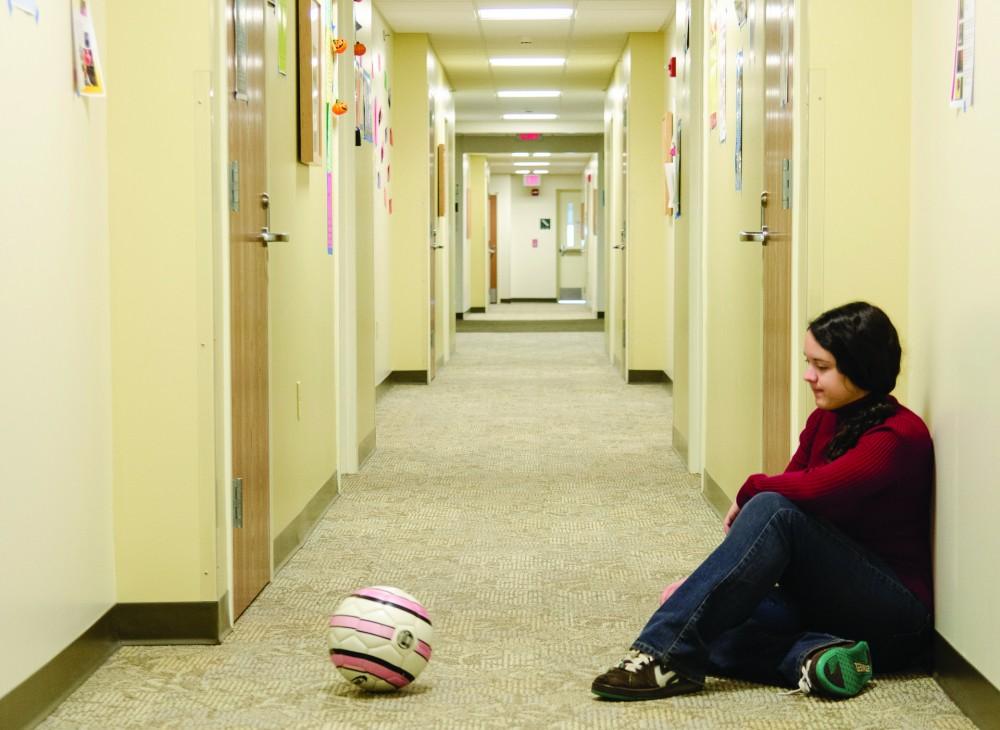GV counselors prep students for the transition back home

GVL/Jessica Hollenbeck
Dec 6, 2012
With his first semester of college under his belt, Grand Valley State University freshman Tyler Lovell is preparing to head home to Kalamazoo, Mich. for the holidays.
However, he’s not particularly looking forward to leaving his nest in Allendale.
“It’s going to be weird not hanging out with my roommates and my friends pretty much every day,” Lovell said. “With my family, I can’t do the same things that I can do with my friends.”
On top of leaving his new college buddies, he has the responsibilities of his job awaiting him, and he said he’s not very excited for that either.
Lovell is one of many students torn about heading home for the three-week winter break.
Sara Byczek, senior counselor at GVSU’s Counseling and Career Development Center, kept students like Lovell in mind as she hosted Wednesday’s “Transitioning Home for the Holidays,” a program meant to teach students how to take care of themselves over break.
“Going home for the holidays can be a challenging time for students due to multiple reasons,” Byczek said. “Many students are used to living on their own without parental supervision, and the change to being back under a family member’s roof can cause family difficulties. Also, the holiday break can be full of multiple obligations, which may be overwhelming for students. As well, students may not have a great relationship with family and returning home to this can cause stress.”
The counselor distributed handouts at the program that address different concerns students may have about the holidays, including budgeting issues, family stress and “holiday blues.” Participants also took a quiz to help them identify their holiday stress level.
“I think this is a pretty common topic that is addressed at universities since nationally the holiday season can be more stressful for everyone,” Byczek said. “But there are particular issues that college students may face that the population as a whole may not, including the renewed supervision, financial struggles, multiple obligations, connecting with old friends and possibly recognizing that things are not the same as when they were living at their home.”
She offered a few words of advice for students in situations like these.
First, be realistic.
“Accept that things aren’t always going to go as planned,” she advised. “Then take active steps to manage stress and depression during the holidays.”
Second, accept change.
“As families change and grow, traditions and rituals often change as well,” she said. “Hold on to those you can and want to. But accept that you may have to let go of others. For example, if your siblings can’t all gather at your house as usual, find new ways to celebrate together from afar, such as sharing pictures, emails or videotape.”
Third, set differences aside.
“Try to accept family members and friends as they are, even if they don’t live up to all your expectations,” she said. “Practice forgiveness. Set aside grievances until a more appropriate time for discussion. With stress and activity levels high, the holidays might not be conducive to making quality time for relationships. And be understanding if others get upset or distressed when something goes awry. Chances are they’re feeling the effects of holiday stress and depression, too.”
Fourth, learn to say no.
“Believe it or not, people will understand if you can’t do certain projects or activities,” she said. “If you say yes only to what you really want to do, you’ll avoid feeling resentful, bitter and overwhelmed. If it’s really not possible to say no when your boss asks you to work overtime, try to remove something else from your agenda to make up for the lost time.”
Fifth, take a breather.
“Make some time for yourself,” she advised. “Spending just 15 minutes alone, without distractions, may refresh you enough to handle everything you need to do. Steal away to a quiet place, even if it’s to the bathroom for a few moments of solitude. Take a walk at night and stargaze. Listen to soothing music. Find something that reduces stress by clearing your mind, slowing your breathing and restoring inner calm.”
Finally, forget about perfection and accept imperfections in oneself and in others.
“Holiday TV specials are filled with happy endings,” she said. “But in real life, people don’t usually resolve problems within an hour or two. Something always comes up. You may get stuck at the airport, your sister may dredge up an old argument, your partner may burn the cookies, and your mother may criticize how you’re dressed—all in the same day.”
Byczek said the concern about winter break is one that really resonates with freshmen because college is typically their first time away from home, so the return home has its own “unique” stressors. However, the topic applies to all students, particularly those who have family stress or negative associations with the holiday season.
“I don’t think there is a group that has more difficulty transitioning than another,” she said. “I think that it matters more what the student’s support system is. If the student does not have a healthy support system in their home area, or their only support is through the university and they do not return back to a family, it can be a difficult time since their support system may not be around.”
For students staying in their local housing instead of returning to their families, Byczek suggested retaining some form of routine and making a point to reach out to social support so that they do not become isolated during the holiday season.
For more counsel about returning home, students can contact the center at 616-331-3266.
[email protected]






















